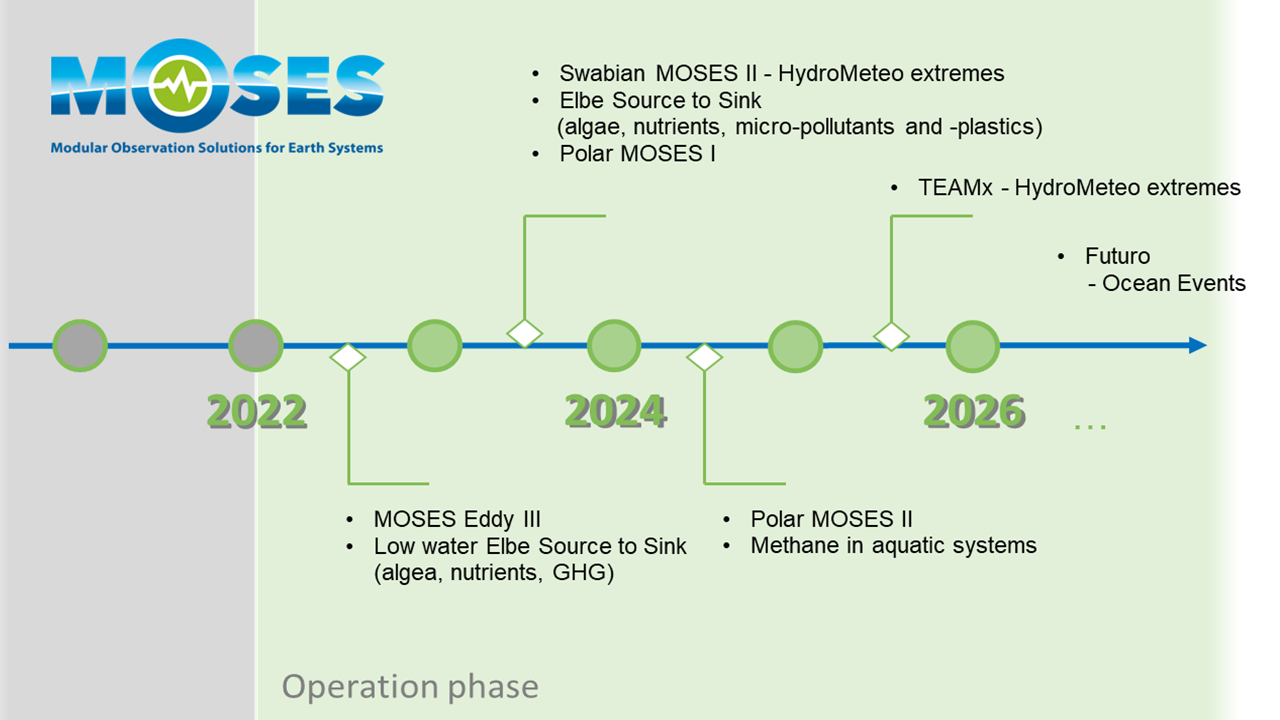Campaigns and Future Plans
Since 2022, the observation system is fully operational and has been used regularly in campaigns at national and international level. Listed below are mostly long- and medium-term planned MOSES campaigns. In addition, ad hoc missions continue to be an option for meteorological and hydrological extremes - according to the personnel and equipment capacities available at the time.
A list of campaigns linked with campaign information is also available on PANGAEA.

- GHG emissions Elbe River, tributaries and German Bight, 2024 and 2025
Study on the contribution of greenhouse gas fluxes (CO2, CH4, N2O) from coastal regions and inland waters to the atmospheric carbon budget with a focus on the causes of temporal and spatial heterogeneity.
Helmholtz Centres: AWI, HEREON, GEOMAR, UFZ
Partners: German Universities, Leibniz Institute Warnemünde, Bundesamt für Seeschifffahrt und Hydrographie (BSH)
- TEAMx meteorological and hydrological extremes Central Alps, 2024 - 2025
MOSES participates in the international TEAMx campaign which studies the formation and impacts of extreme weather conditions across scales and systems.
MOSES coordination: KIT
Partners: International consortium
Info TEAMx
- Polar MOSES II Svalbard, 2024
[Keyword MOSES_2024_Permafrost_Svalbard]
Continuation of 2023 campaign.
The investigations focus on event-driven GHG emissions in sub-arctic and arctic regions. Triggers are hot spells, heavy precipitation or marine current anomalies.
Helmholtz Centres: AWI, HEREON, UFZ, KIT
Partners: International AWIPEV station
- FUTURO Ocean Events coastal upwelling region off West Africa, 2026 -2027
The team "Carbon Dynamics in Ocean Events" started the planning for the international experiment FUTURO (Future of Tropical Upwelling Regions in the Atlantic Ocean). With the experiment scheduled from 2026 onwards over a complete annual cycle, it is intended to achieve decisive scientific progress in the coupling of the physical-chemical-biological-geological system and socio-economic research.
MOSES coordination: GEOMAR
Partners: International consortium
- Swabian MOSES II, June - September 2023
[Keyword MOSES_2023_Swabian]
A second Swabian MOSES campaign is conducted in 2023 to investigate the formation, development and impacts of convective storms. Event observation data will be combined with modeling and data assimilation methods as well as impact analyses.
Helmholtz Centres: KIT, UFZ, FZJ, GFZ, DLR
Partners: German Universities, German Weather Service (DWD)
more
press release KIT
press release UFZ
- Elbe River pollutants from source to sink, June - September 2023
[Keyword MOSES_2023_Elbe-NorthSea]
Extension of the monitoring concept to transport and degradation of micro-pollutants and micro/nano-plastics, covering the Elbe River from its Czech spring to the German Bight. The chemical footprint of agriculture, sewage treatment plants, industry and settlement areas in the river water is studied in order to better estimate pollutant inputs under extreme conditions such as low water or floods.
Helmholtz Centres: UFZ, HEREON, AWI, GEOMAR
Partners: Flussgebietsgemeinschaft Elbe, Czech Academy of Sciences
more
press release UFZ
- Polar MOSES I Svalbard, July - August 2023
[Keyword MOSES_2023_Permafrost_Svalbard]
Polar-MOSES continues and expands the previous permafrost campaigns. The investigations focus on event-driven GHG emissions in sub-arctic and arctic regions. Triggers are hot spells, heavy precipitation or marine current anomalies.
Helmholtz Centres: AWI, HEREON, UFZ, KIT
Partners: International AWIPEV station
- Low water Elbe River from source to sink, April - September 2022
Comprehensive study on the temporal and spatial heterogeneity of GHG-emissions due to the extreme low water situation. The investigations on algae and nutrient dynamics along the continuum river-estuary-ocean were extended, starting at the Czech river spring to the German Bight.
Helmholtz Centres: UFZ, HZG, AWI, GEOMAR
Partners: Flussgebietsgemeinschaft Elbe, Czech Academy of Sciences
- Ocean eddies Tropical Atlantic off Mauritania, June - July 2022
Field work on the multi-year MOSES eddy study was completed in 2022. The investigations focused on carbon transport from the sea surface to the seafloor and mechanisms of the biological carbon pump.
Helmholtz Centres: GEOMAR, HEREON
Partners: German Universities

